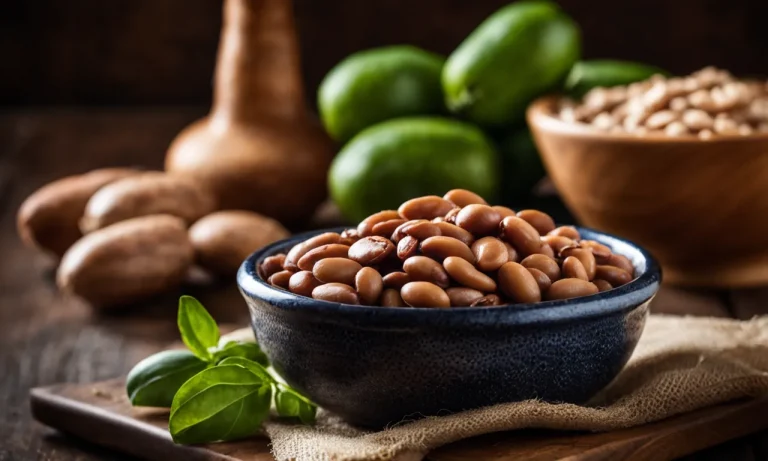What’S Another Word For Vegan? Common Synonyms And Alternatives
If you’re looking for another word for vegan, you have plenty of options. While vegan is the most common term used to describe someone who eats a plant-based diet and avoids all animal products, there are many other synonymous words and phrases you can use instead.
Here’s a quick answer: Some common synonyms for vegan include plant-based, animal-free, cruelty-free, vegetarian, lacto-vegetarian, ovo-vegetarian, and strict vegetarian. You can also use terms like herbivore, fruitarian, or refer to someone as following a vegan diet or lifestyle.
In this comprehensive guide, we will explore over 15 different words and phrases that can be used as alternatives to vegan. We’ll compare their meanings and discuss when you might want to use one term over another.
Whether you’re vegan yourself or just want a better understanding of the various labels, this guide covers them all.
Plant-Based
When it comes to adopting a vegan lifestyle, there are several terms that can be used interchangeably. One of the most common synonyms for vegan is “plant-based.” This term refers to a diet and lifestyle that is centered around consuming foods derived from plants, while avoiding animal products and by-products.
What Does Plant-Based Mean?
Plant-based refers to a diet that primarily consists of foods that come from plants, such as fruits, vegetables, grains, legumes, nuts, and seeds. This dietary pattern emphasizes the consumption of whole, unprocessed foods, and excludes or minimizes the intake of animal products, including meat, poultry, fish, eggs, and dairy products.
Individuals who follow a plant-based diet typically focus on consuming foods that are rich in nutrients, fiber, and antioxidants, while reducing their intake of saturated fats and cholesterol. This dietary approach has been associated with numerous health benefits, including a reduced risk of chronic diseases like heart disease, obesity, and certain types of cancer.
Plant-Based vs. Vegan: Is There a Difference?
While plant-based and vegan are often used interchangeably, there can be slight differences in how individuals interpret and practice these terms. Veganism is not just limited to dietary choices, but also extends to other aspects of life, such as avoiding the use of animal-derived products in clothing, cosmetics, and other everyday items.
On the other hand, plant-based is primarily focused on dietary choices and may not necessarily encompass all aspects of veganism. Some individuals may identify as plant-based if they primarily follow a plant-based diet but still use or wear animal-derived products.
However, it’s important to note that the terms plant-based and vegan ultimately share the same core principle: the avoidance of animal products. Whether someone identifies as plant-based or vegan, both terms embrace a compassionate and sustainable approach to living.
The Growth of Plant-Based Diets
In recent years, plant-based diets have gained significant popularity, as more people become aware of the environmental, ethical, and health implications of consuming animal products. This growth is reflected in the increased availability of plant-based options in restaurants, grocery stores, and even fast-food chains.
According to a report by The Good Food Institute, plant-based food sales in the United States reached $5 billion in 2020, a 43% increase from the previous year. This statistic demonstrates the growing demand for plant-based alternatives and the shift towards a more plant-centric approach to eating.
The Benefits of Embracing a Plant-Based Lifestyle
Embracing a plant-based lifestyle can have numerous benefits for both the individual and the planet. Some of the key advantages include:
- Improved health: Plant-based diets are rich in essential nutrients, fiber, and antioxidants, which can support overall health and reduce the risk of chronic diseases.
- Environmental sustainability: Animal agriculture is a significant contributor to greenhouse gas emissions, deforestation, and water pollution. By choosing plant-based options, individuals can reduce their carbon footprint and help protect the planet.
- Animal welfare: Adopting a plant-based lifestyle promotes compassion towards animals and reduces the demand for animal exploitation in the food industry.
Whether you prefer to use the term vegan or plant-based, both reflect a conscious decision to prioritize the consumption of plant-derived foods and make choices that align with your values and beliefs.
So, whether you’re enjoying a delicious plant-based burger or a vegan lasagna, you’re making a positive impact on your health, the environment, and animal welfare.
Animal-Free
When it comes to the world of veganism, there are many terms and phrases that are used to describe a lifestyle and diet that avoids the use of animal products. One common synonym for vegan is “animal-free.”
This term emphasizes the avoidance of any products that come from animals, whether it is meat, dairy, eggs, or even honey.
Embracing an Animal-Free Lifestyle
Embracing an animal-free lifestyle goes beyond just the food that one consumes. It also extends to other aspects of life, such as clothing, cosmetics, and household products. Vegans who choose to live an animal-free lifestyle are committed to not using any products that have been tested on animals or contain any animal-derived ingredients.
Did you know? The term “animal-free” can also be used to describe a product or service that is completely free from any animal involvement. For example, a company may advertise their cosmetics as “animal-free” to indicate that no animals were harmed or used in the production or testing of their products.
Benefits of an Animal-Free Lifestyle
There are numerous benefits to adopting an animal-free lifestyle. From a health perspective, a plant-based diet can contribute to lower cholesterol levels, reduced risk of heart disease, and improved overall well-being.
Additionally, by avoiding animal products, individuals are reducing their carbon footprint and contributing to the preservation of natural resources.
Fun Fact: Did you know that the production of animal products is a major contributor to greenhouse gas emissions? Going animal-free can have a significant positive impact on the environment.
Resources for Animal-Free Living
If you are interested in embracing an animal-free lifestyle, there are many resources available to help you along the way. There are numerous websites, blogs, and social media accounts dedicated to providing information, recipes, and support for those looking to make the transition to an animal-free lifestyle.
One such resource is The Vegan Society, a well-known organization that provides guidance and resources for vegans. They offer a wealth of information on veganism, including tips for transitioning to an animal-free lifestyle and delicious plant-based recipes.
Another helpful resource is PETA (People for the Ethical Treatment of Animals), an organization that works to promote animal rights and veganism. Their website offers a variety of resources, including guides on animal-free living and a database of cruelty-free products.
By embracing an animal-free lifestyle and using the term “animal-free” to describe this choice, individuals can contribute to the well-being of animals, the environment, and their own health. Whether you’re already vegan or considering making the switch, exploring the world of animal-free living can be a rewarding and fulfilling journey.
Cruelty-Free
When it comes to finding alternatives to the term “vegan,” one commonly used synonym is “cruelty-free.” This term emphasizes the ethical aspect of a lifestyle that avoids the use of animal products. Just like vegans, those who embrace a cruelty-free lifestyle strive to eliminate any form of cruelty or harm towards animals.
This includes not only avoiding animal-derived foods but also abstaining from using products that have been tested on animals or contain animal ingredients.
Cruelty-free products are becoming more popular as people become more aware of the ethical implications of animal testing. Many cosmetic and personal care brands now proudly display the cruelty-free label on their packaging, indicating that their products have not been tested on animals.
This shift in consumer preferences has led to a growing market for cruelty-free alternatives, making it easier for individuals to adopt a cruelty-free lifestyle.
Choosing Cruelty-Free Products
When shopping for cruelty-free products, it’s essential to look for certifications from trusted organizations such as Leaping Bunny or PETA. These certifications ensure that the products have not been tested on animals.
Additionally, you can also look for specific labels like “vegan” or “plant-based” to ensure that the products do not contain any animal-derived ingredients.
Fortunately, finding cruelty-free alternatives is now more accessible than ever. Many online platforms and apps provide comprehensive databases of cruelty-free products, making it easier for consumers to make informed choices.
By opting for cruelty-free options, individuals can contribute to the welfare of animals and support brands that prioritize ethical practices.
Benefits of a Cruelty-Free Lifestyle
Adopting a cruelty-free lifestyle goes beyond just personal choices; it also has a positive impact on the environment and human health. By avoiding products that are tested on animals, individuals can help reduce the demand for animal testing, which can be both cruel and unnecessary.
Additionally, many cruelty-free products are also free from harmful chemicals and toxins, making them safer for the consumer.
Furthermore, choosing cruelty-free alternatives can lead to a more sustainable lifestyle. The production of animal-derived products often involves significant environmental damage, including deforestation, greenhouse gas emissions, and water pollution.
By opting for cruelty-free options, individuals can contribute to the conservation of natural resources and promote a more sustainable future.
Vegetarian
When it comes to dietary choices, vegetarianism is a popular alternative to a meat-based diet. Vegetarians exclude meat, poultry, and seafood from their diets, but still consume plant-based foods such as fruits, vegetables, grains, legumes, nuts, and seeds.
There are different types of vegetarians, each with their own specific dietary restrictions and preferences. Let’s explore a few of them:
Lacto-Vegetarian
A lacto-vegetarian is someone who abstains from consuming meat, poultry, seafood, and eggs, but still includes dairy products in their diet. This means that a lacto-vegetarian’s meals will often include milk, cheese, yogurt, and other dairy-based products.
It’s important for lacto-vegetarians to ensure they are getting enough protein and nutrients from plant-based sources.
Ovo-Vegetarian
An ovo-vegetarian is similar to a lacto-vegetarian, but instead of including dairy products, they include eggs in their diet. Ovo-vegetarians avoid meat, poultry, seafood, and dairy products, but still enjoy eggs and egg-based dishes.
Eggs are a great source of protein and can be a versatile ingredient in vegetarian cooking.
Lacto-Ovo Vegetarian
A lacto-ovo vegetarian is someone who combines the dietary restrictions of both lacto-vegetarianism and ovo-vegetarianism. This means that they exclude meat, poultry, and seafood from their diet, but include both dairy products and eggs.
Lacto-ovo vegetarians have a wide variety of food options available to them and can enjoy a balanced diet that includes plant-based proteins, dairy, and eggs.
It’s worth mentioning that while these terms are commonly used to describe different types of vegetarians, there may be variations and individual interpretations of these dietary choices. It’s always a good idea to consult with a healthcare professional or registered dietitian to ensure you are meeting your nutritional needs when following a vegetarian diet.
Herbivore
When it comes to finding another word for “vegan,” one common synonym that often comes up is “herbivore.” While vegans choose to follow a plant-based diet and lifestyle for various reasons, herbivores are animals that naturally eat plant-based foods.
Understanding Herbivores
Herbivores are a diverse group of animals that rely on plants as their primary source of nutrition. They have specialized digestive systems that allow them to break down plant matter and extract the necessary nutrients.
Many herbivorous animals, such as cows, deer, and rabbits, have teeth and digestive systems adapted specifically for consuming plants.
Unlike herbivorous animals, humans have the ability to choose their dietary preferences. While some individuals may choose to adopt a plant-based diet and refer to themselves as “herbivores,” it is important to note that this term is more commonly used to describe animals in the natural world.
Other Synonyms and Alternatives
While “herbivore” is one alternative to the term “vegan,” there are other synonyms that can be used to describe individuals who follow a plant-based lifestyle:
- Plant-based: This term is often used interchangeably with “vegan” and refers to a diet and lifestyle that focuses on consuming plant-based foods.
- Plant-powered: Another alternative synonym for “vegan,” this term emphasizes the energy and vitality gained from a plant-based diet.
- Plant-eater: This simple and straightforward term describes someone who primarily consumes plant-based foods.
- Vegetarian: While not exactly synonymous with “vegan,” vegetarians also follow a plant-based diet, but may still consume dairy products, eggs, or other animal by-products.
It’s important to remember that these terms may have slightly different connotations and meanings, so it’s always best to clarify one’s dietary preferences when using these synonyms.
If you want to learn more about veganism and plant-based diets, you can visit The Vegan Society or PETA for more information.
Fruitarian
Fruitarian is another word that is often used to describe someone who follows a diet primarily consisting of fruits. This term is derived from the word “fruit” and is used to emphasize the importance of fruits in a person’s diet.
A fruitarian diet typically includes a wide variety of fruits, such as apples, bananas, oranges, and berries.
Fruitarians believe that eating only fruits is not only beneficial for their health but also aligns with their ethical and environmental values. They argue that consuming fruits directly from plants is a more sustainable and compassionate way of living, as it minimizes harm to animals and reduces the carbon footprint associated with meat and dairy production.
Benefits of a Fruitarian Diet
There are several potential benefits associated with following a fruitarian diet. Fruits are rich in essential vitamins, minerals, and antioxidants, which are all important for maintaining good health. They are also a great source of dietary fiber, which aids in digestion and promotes a healthy gut.
Additionally, fruits are low in calories and high in water content, making them a great choice for weight management. Many fruitarians report feeling lighter, more energized, and experiencing better digestion after adopting this diet.
Challenges of a Fruitarian Diet
While a fruitarian diet can offer numerous health benefits, it also comes with its own set of challenges. One of the main concerns is meeting all of the body’s nutritional needs. Fruits are generally low in certain essential nutrients, such as protein, iron, and calcium.
Therefore, it is crucial for fruitarians to carefully plan their meals and ensure they are getting enough of these nutrients from other sources.
Another challenge is the availability and variety of fruits throughout the year. Depending on where a person lives, certain fruits may only be available seasonally, which can limit the variety in a fruitarian’s diet.
Additionally, fruits can be more expensive compared to other food groups, making it less accessible for some individuals.
Following a Vegan Diet/Lifestyle
Following a vegan diet means abstaining from consuming any animal products, including meat, dairy, eggs, and honey. It is a lifestyle choice that extends beyond just food choices and encompasses a commitment to not use or wear any animal-derived products, such as leather or silk.
People choose to follow a vegan diet for various reasons, including ethical concerns for animal welfare, environmental sustainability, and health benefits.
Environmental Benefits of Veganism
Veganism has gained popularity due to its positive impact on the environment. Animal agriculture is a significant contributor to greenhouse gas emissions, deforestation, and water pollution. By adopting a vegan lifestyle, individuals can reduce their carbon footprint and help combat climate change.
According to a study published in the journal Scientific Reports, a vegan diet can reduce greenhouse gas emissions by up to 84% compared to a typical Western diet.
Health Benefits of a Vegan Diet
In addition to its environmental benefits, a vegan diet can also have numerous health benefits. A well-planned vegan diet can provide all the necessary nutrients, including protein, iron, calcium, and vitamin B12.
Studies have shown that vegans tend to have lower body mass indexes (BMIs) and lower cholesterol levels compared to non-vegans. They are also at a reduced risk of developing chronic diseases such as heart disease, type 2 diabetes, and certain types of cancer.
It is important for vegans to ensure they are getting a balanced diet by including a variety of plant-based foods such as fruits, vegetables, whole grains, legumes, nuts, and seeds. Vegan alternatives to animal products, such as plant-based milks, tofu, tempeh, and seitan, are readily available in most grocery stores.
Ethical Considerations
For many vegans, ethical concerns regarding animal welfare are the primary motivation for adopting a vegan lifestyle. They believe that animals have the right to live free from harm and exploitation. The conditions in which animals are raised for food production, such as factory farming, are often criticized for their cruelty and disregard for animal well-being.
By choosing to follow a vegan diet, individuals can align their actions with their ethical beliefs and promote compassion towards animals.
Conclusion
While vegan is the most widely used and understood label for those who avoid animal products, there are many other synonymous terms you can use as well. Choosing alternative words like plant-based, vegetarian, or cruelty-free allows you to tailor your language for different contexts.
No matter what terminology feels right for you, adopting a vegan diet and lifestyle is compassionate choice that helps people, animals, and the planet.







